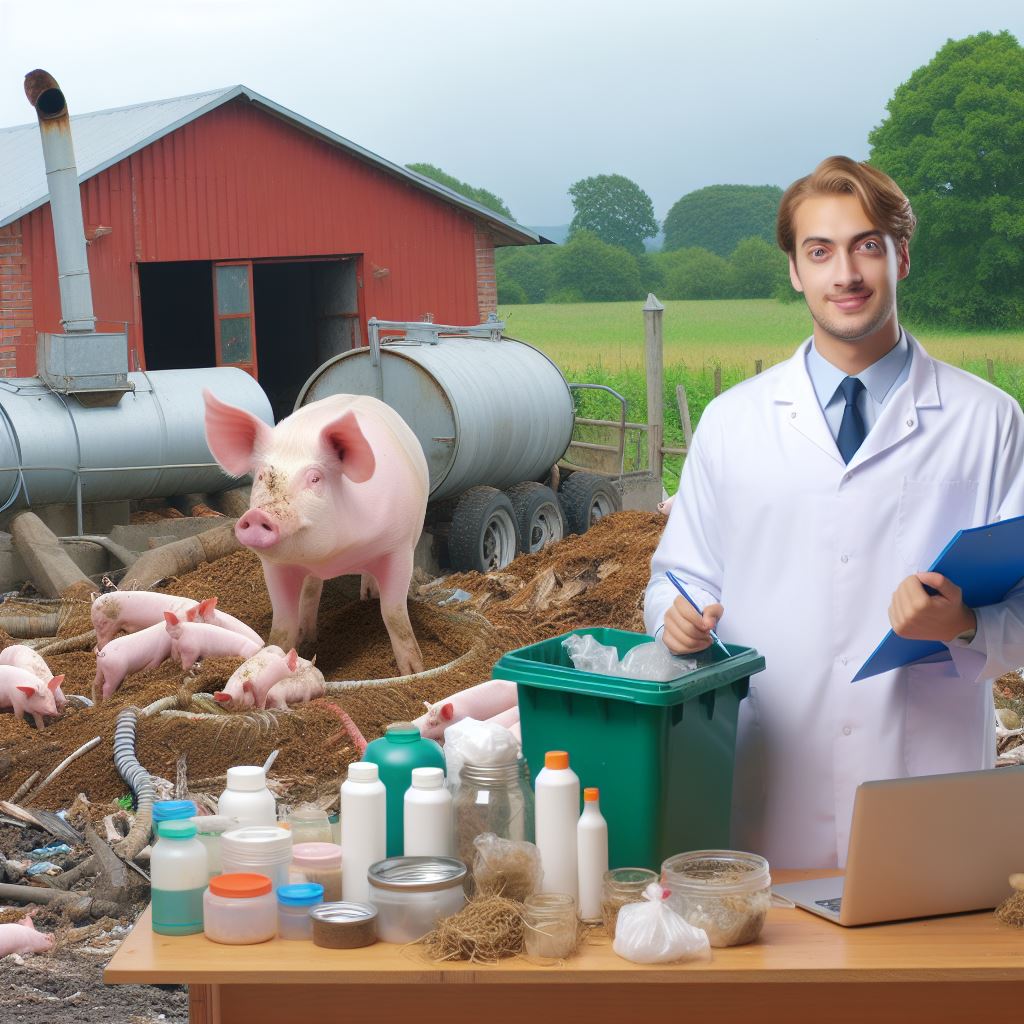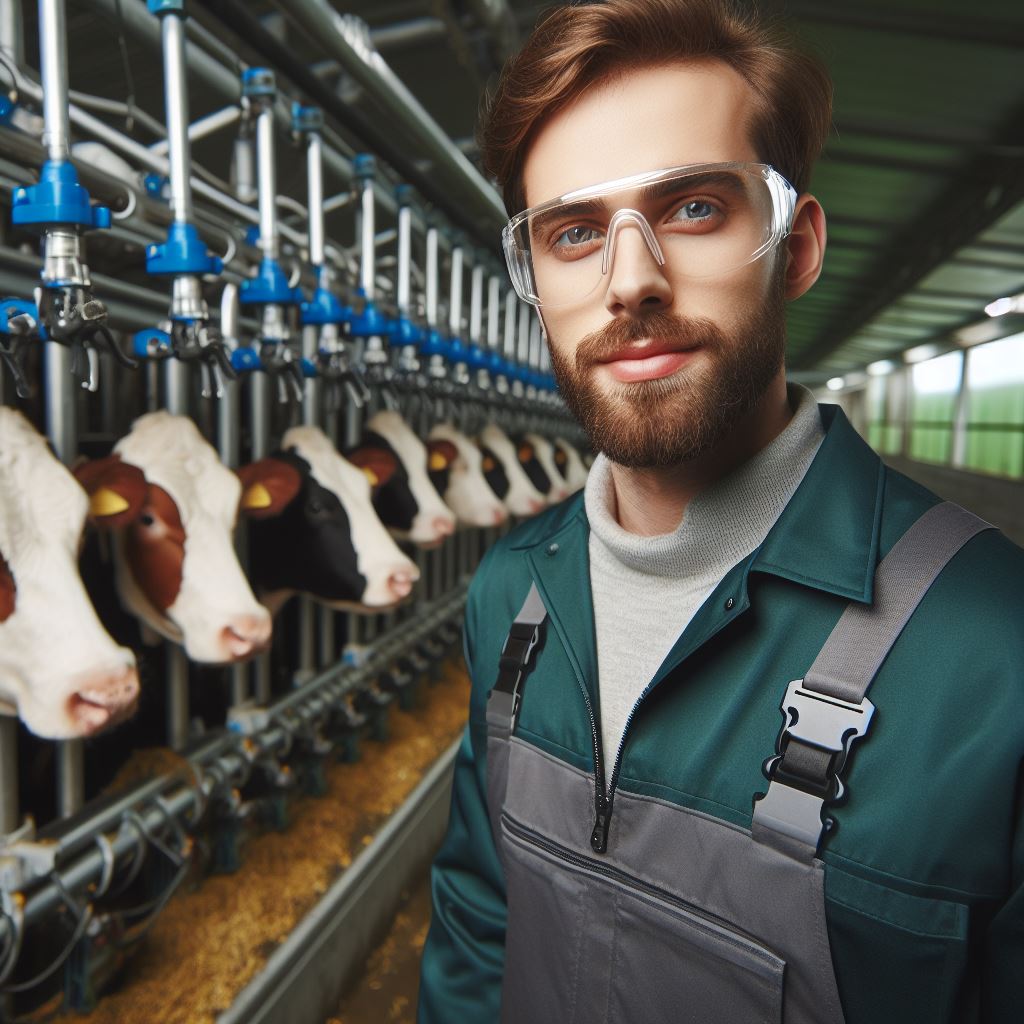Introduction
Overview of waste management
Waste management is crucial in pig farms to maintain cleanliness and prevent health risks.
It ensures proper handling and disposal of waste materials, preventing pollution and promoting sustainability.
Implementing effective waste management practices is essential for the overall well-being of the animals, the environment, and farm workers.
Pig farms generate large amounts of waste, including manure, urine, and leftover feed.
Without proper management, these waste materials can contaminate water sources, emit harmful gases, and spread diseases.
Therefore, waste management plays a vital role in maintaining a healthy and sustainable operation.
Importance of waste management in pig farms
One of the key benefits of waste management in pig farms is the prevention of environmental pollution.
By properly collecting, storing, and treating waste, farmers can minimize the release of pollutants into the air, soil, and water.
This is crucial for preserving the local ecosystem and preventing the contamination of nearby farms and communities.
Additionally, efficient waste management reduces the risk of disease transmission.
Poorly managed waste can harbor pathogens that can infect both animals and humans.
By implementing proper disposal techniques, such as composting or anaerobic digestion, farmers can significantly minimize the spread of diseases and protect the health of their livestock and workers.
Moreover, waste management promotes resource efficiency and sustainability.
By reusing or recycling waste materials, pig farmers can reduce their reliance on external inputs and save costs.
For example, composted manure can be used as fertilizer, contributing to soil fertility and reducing the need for chemical alternatives.
Transform Your Agribusiness
Unlock your farm's potential with expert advice tailored to your needs. Get actionable steps that drive real results.
Get StartedTherefore, waste management is of utmost importance in pig farms, considering its environmental, health, and economic impacts.
By implementing effective waste management practices, farmers can ensure the well-being of their animals, protect the environment, and promote sustainable agriculture.
Types of waste generated in pig farms
In pig farms, several types of waste are generated, each with its own characteristics and environmental implications.
Manure
- Manure is one of the primary types of waste produced in pig farms.
- Its composition consists of pig feces, urine, bedding materials, and water.
- Manure is rich in nutrients such as nitrogen, phosphorus, and organic matter.
- The quantity of manure produced depends on the number of pigs and their age.
Solid Waste
- Alongside manure, pig farms generate solid waste from various sources.
- This includes bedding materials like straw, sawdust, or wood chips used for the pigs’ comfort.
- Feed leftovers, which are unused or unconsumed pig feed, also contribute to solid waste.
- Additionally, dead animals within the farm are categorized as solid waste.
Wastewater
- Wastewater is another form of waste that pig farms produce.
- It originates from several sources, including washing pig pens and equipment.
- The composition of wastewater includes manure, urine, cleaning agents, and leftover feed.
- The volume of wastewater largely depends on the size of the farm and the cleaning practices.
Managing these different types of waste is crucial to minimize pollution and environmental damage.
Proper waste management in pig farms safeguards the environment, ensuring animal and worker well-being.
Methods employed include
- Utilizing manure as nutrient-rich fertilizer.
- Processing manure through anaerobic digestion for biogas production.
- Composting solid waste for organic fertilizer creation, recycling nutrients into the soil.
However, careful dead animal disposal is crucial to prevent disease spread, adhering to relevant regulations.
Effective wastewater treatment involves sedimentation, filtration, and biological processes to remove contaminants.
Treated wastewater can be released into the environment or recycled for irrigation.
Proper storage facilities prevent spills; regular maintenance is necessary for integrity.
Educating farmers and workers on waste management regulations and risks is vital for compliance.
Most importantly, waste management is critical for environmental protection and sustainable farming practices on pig farms.
Implementation of effective strategies not only ensures a cleaner and healthier agricultural sector but also harnesses waste potential for energy and fertilization.
Read: Pig Farm Biosecurity Essentials
Environmental and health risks associated with inadequate waste management
Proper waste management in pig farms is crucial to mitigate the environmental and health risks associated with inadequate waste management practices.
Failure to effectively manage waste can result in water pollution, odor problems, and disease transmission.
Water pollution
Inadequate waste management can lead to the contamination of nearby streams and rivers.
Runoff and leakage from waste storage structures can seep into the water sources, introducing harmful substances into the aquatic environment.
The presence of pollutants can have adverse effects on aquatic life, disrupting the ecosystem and compromising water quality.
Odor problems
Poor waste management practices can also cause odor problems, impacting nearby communities.
Accumulated waste emits strong and unpleasant odors, which can negatively affect the quality of life for residents in the vicinity.
Additionally, the unpleasant odor can create a negative image for the pig farming industry as a whole, leading to public criticism and concerns.
Disease transmission
Inadequate waste management increases the risk of disease transmission both within the pig population and to humans.
Pathogens present in the waste can contaminate water sources, facilitating the spread of diseases through waterborne transmission.
Airborne transmission is also a concern, as the release of particulate matter and gases from improperly managed waste can carry harmful pathogens, posing a threat to both animals and humans.
Showcase Your Farming Business
Publish your professional farming services profile on our blog for a one-time fee of $200 and reach a dedicated audience of farmers and agribusiness owners.
Publish Your ProfileImplementing proper waste management techniques is crucial to mitigate these environmental and health risks.
Pig farmers should prioritize the following measures:
- Investing in appropriate storage structures and systems to prevent leakage and runoff.
- Regularly monitoring water quality to detect and address any contamination issues promptly.
- Implementation of waste treatment processes, such as filtration or biogas production systems.
- Regular removal and proper disposal of waste to minimize odor problems.
- Adherence to regulations and guidelines set by regulatory bodies regarding waste management practices.
By taking these steps, pig farmers can minimize the negative impact of waste management on the environment, public health, and the reputation of the pig farming industry as a whole.
It is essential to prioritize sustainable and responsible waste management practices to ensure the long-term viability of pig farms while safeguarding the environment and the well-being of both animals and humans.
Read: Pig Behavior: Understanding Your Herd

Best practices for waste management in pig farms
Effective waste management in pig farms is essential to protect the environment and ensure sustainable farming practices.
By implementing these best practices, pig farmers can minimize the negative impacts of waste on the surrounding ecosystem and maximize the use of valuable resources.
Manure management
Composting is a widely used method in pig farms to manage manure.
It involves the decomposition of organic waste materials, such as manure, into a nutrient-rich compost that can be used to fertilize fields.
This process not only reduces the volume of waste but also produces a valuable soil amendment.
Anaerobic digestion is another effective method for pig farm waste management.
It involves the breakdown of organic waste in the absence of oxygen, using bacteria.
This process not only helps reduce waste but also generates biogas, a renewable source of energy.
The biogas can be used to produce heat and electricity, reducing the farm’s reliance on fossil fuels.
Implementing a nutrient management plan is crucial for pig farms to ensure the proper application of manure to the fields.
This plan takes into account the nutrient content of the manure and the nutrient needs of the crops.
By following a nutrient management plan, pig farms can optimize fertilizer applications, minimize nutrient runoff, and protect water quality.
Solid waste management
Proper storage and disposal of solid waste are critical for pig farms to prevent littering and environmental contamination.
By providing designated areas for the storage and disposal of solid waste, pig farms can minimize the risk of pollution.
They can also explore options for recycling materials like plastics and metals to further reduce waste volumes.
Wastewater management
Wastewater management is another important aspect of waste management in pig farms.
Constructing lagoons or storage ponds allows for the collection and storage of wastewater, preventing water pollution.
Proper treatment processes, such as filtration or chemical treatment, are necessary to ensure the wastewater is safe for the environment.
By following safe land application techniques, pig farms can utilize the wastewater as a valuable source of nutrient-rich irrigation water while minimizing the risk of nutrient runoff and soil contamination.
In essence, implementing best practices for waste management in pig farms is vital for sustainable farming practices and environmental protection.
By managing manure, solid waste, and wastewater effectively, pig farmers can minimize the negative impacts on the environment and maximize the use of valuable resources.
Composting and anaerobic digestion are effective methods for managing manure, while proper storage, recycling, and reusing help manage solid waste.
Constructing lagoons or storage ponds, applying treatment processes, and adopting safe land application techniques are essential for wastewater management.
Read: Layer vs. Broiler: Choosing Your Poultry Path
Regulations and guidelines for waste management in pig farms
Waste management in pig farms is a critical aspect that requires proper regulations and guidelines to ensure environmental sustainability and the health and safety of both animals and humans involved in the industry.
One of the key aspects of waste management in pig farms is adhering to environmental regulations.
These regulations aim to minimize the negative impacts of waste generated by pig farms on the environment.
They often include guidelines on the proper handling, storage, and disposal of waste materials.
Health and safety guidelines
Health and safety guidelines are another crucial aspect of waste management in pig farms.
These guidelines focus on protecting the health and safety of workers and animals.
They outline procedures and protocols to prevent the spread of diseases and ensure the proper handling and treatment of waste materials to minimize risks.
Compliance requirements
Compliance with regulations and guidelines is essential for pig farms to operate legally and responsibly.
Farms must meet specific requirements set by regulatory bodies to maintain their licenses and avoid penalties.
Compliance often involves regular inspections, proper record-keeping, and evidence of adherence to waste management protocols.
To ensure compliance, pig farms need to establish effective waste management systems.
Showcase Your Farming Business
Publish your professional farming services profile on our blog for a one-time fee of $200 and reach a dedicated audience of farmers and agribusiness owners.
Publish Your ProfileThis includes implementing practices such as proper waste segregation, using appropriate storage and disposal facilities, and regularly monitoring and documenting waste management activities.
Farms must also train their staff on waste management procedures and provide them with necessary protective equipment.
Pig farms should also consider utilizing nutrient management plans to optimize the use of pig waste as a resource.
These plans identify ways to safely recycle and utilize the nutrients found in pig waste, such as through the production of organic fertilizers.
By doing so, farms can minimize their environmental impact while also benefiting from the nutrient-rich waste.
It is essential for pig farms to stay updated on any changes in regulations and guidelines related to waste management.
Regulatory bodies may revise and update these requirements periodically to ensure continuous improvement in waste management practices.
Farms should actively engage with regulatory agencies and industry associations to stay informed and adapt their waste management systems accordingly.
In fact, waste management in pig farms requires adherence to environmental regulations, health and safety guidelines, and compliance with specific requirements.
Farms must establish effective waste management systems, train their staff, and consider nutrient management plans to optimize the use of waste.
Staying updated on regulations is essential to ensure continuous improvement in waste management practices in the industry.
Proper waste management not only protects the environment but also promotes the well-being of animals and humans involved in pig farming.
Read: Poultry Management: Key Techniques
Benefits of effective waste management
Effective waste management practices in pig farms yield various benefits, ranging from environmental advantages to economic, social, and enhanced sustainability.
Let’s explore each of these benefits in detail.
Environmental Benefits
- Reduced water pollution: Implementing effective waste management techniques helps prevent the contamination of nearby water bodies.
- Minimized air pollution: Proper waste management decreases the emission of harmful gases like ammonia and methane.
- Preservation of natural resources: Implementing sustainable waste management practices helps conserve precious resources such as water and land.
- Protection of biodiversity: By limiting the impact of waste on the environment, the diverse ecosystems and species in the surrounding areas are safeguarded.
- Prevention of soil degradation: Proper waste management prevents the accumulation of waste and pollutants in the soil, maintaining its fertility.
Economic Benefits
- Cost savings: Efficient waste management systems reduce the need for additional expenses on waste removal, treatment, and disposal.
- Generation of renewable energy: Pig farm waste, when managed effectively, can be converted into biogas, providing an alternative source of energy.
- Creation of job opportunities: The implementation of waste management practices in pig farms can generate employment in waste treatment and recycling sectors.
- Improved farm productivity: Proper waste management leads to better farm hygiene and disease control, resulting in healthier pigs and higher productivity.
- Enhanced market reputation: Effective waste management can improve the image of pig farms, making them more desirable to customers and stakeholders.
Social Benefits
- Community well-being: By minimizing the negative impact of waste on surrounding communities, effective waste management contributes to their overall health and well-being.
- Public health protection: Proper waste management prevents the spread of diseases and ensures a safe environment for both workers and nearby residents.
- Reduced odor and nuisance: Efficient waste management helps control odors and prevents the release of gases that may cause discomfort to the community.
- Education and awareness: Implementing waste management practices in pig farms creates opportunities to educate the public about environmental stewardship.
- Positive social perception: Communities are more likely to support and collaborate with pig farms that demonstrate responsible waste management practices.
Enhanced Sustainability of Pig Farms
- Resource optimization: Effective waste management enables the efficient use of resources within pig farms, reducing unnecessary waste generation.
- Compliance with regulations: Implementing proper waste management practices ensures pig farms meet legal requirements and environmental standards.
- Long-term viability: By adopting sustainable waste management practices, pig farms can maintain their operations, contributing to the long-term prosperity of the industry.
- Reduced environmental footprint: Effective waste management minimizes the environmental impact of pig farms, fostering sustainable agricultural practices.
- Promotion of circular economy: Efficient waste management encourages the recycling and reuse of resources, supporting a circular economy model for the industry.
Overall, effective waste management in pig farms brings numerous benefits for the environment, economy, society, and the long-term sustainability of the industry.
By prioritizing waste management practices, pig farmers can ensure a clean and thriving environment while maximizing their profits and maintaining positive relationships with their communities.
Conclusion
Waste management in pig farms is crucial for maintaining a healthy and sustainable environment.
Throughout this blog section, we have discussed several key points.
Firstly, we highlighted the various waste products generated in pig farms, including manure, urine, and feed waste.
These waste materials can have severe environmental consequences if not managed properly.
Secondly, we explored the importance of implementing effective waste management practices.
Proper waste management helps in reducing the emission of harmful gases like methane and ammonia, which contribute to air pollution and climate change.
Furthermore, we emphasized the significance of preventing water pollution.
Improper disposal of pig waste can contaminate water bodies, thereby endangering aquatic life and affecting human health.
Additionally, we discussed the benefits of composting and anaerobic digestion as waste management techniques.
Composting can produce nutrient-rich organic fertilizer, while anaerobic digestion generates biogas for energy production.
The implementation of proper waste management practices in pig farms is of utmost importance.
By efficiently managing waste, we can minimize environmental pollution, conserve resources, and support the overall sustainability of pig farming operations.
It is crucial for pig farmers, policymakers, and society as a whole to prioritize waste management and strive for a cleaner and healthier future.




